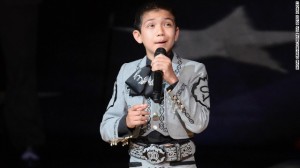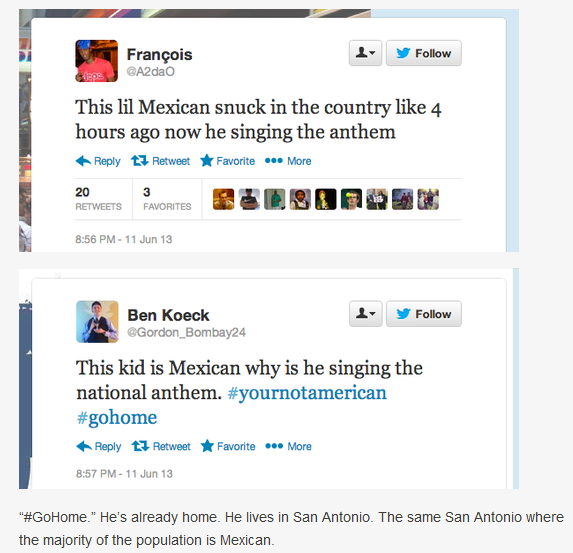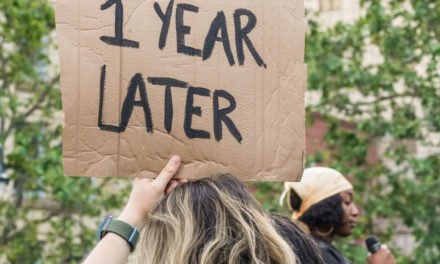 If a little Mexican American boy should not sing the national anthem then maybe an Italian American or an Irish American or any other number of US native born citizens who can trace their heritage back to another country (like the majority of us!) should not sing the national anthem either.
If a little Mexican American boy should not sing the national anthem then maybe an Italian American or an Irish American or any other number of US native born citizens who can trace their heritage back to another country (like the majority of us!) should not sing the national anthem either.
It saddened me to hear that Sebastien De La Cruz, the 11 year old Mexican American who sang the National Anthem in a Mariachi outfit at Game 3 of the NBA finals, declared that it was his fault that there was outpouring of hateful responses on social media. While on the one hand he said the comments did not bother him, he is also credited with saying that he should not have worn the Mariachi outfit.

I do worry about how this experience will impact him in the future. Even though we know that there will always be “racist”, intolerant people, when one has a personal experience with racism it can have long-term psychological impacts.
When I was 5 years old, in kindergarten, a little White boy called the only other Black child in the class and me the “N” word. At the time, I was not even sure what it meant because we did not use that language at home. Somehow, though, my friend and I knew it was not a nice thing to say and we started to cry. The teacher asked us what was wrong and when we told her, she called the little boy over and scolded him by saying, “your red hair and freckles are ugly”. (Dr. Spock would probably not have approved of the teachers methods but my friend and I felt better.) It has been a long time since I was 5 years old but I remember that incident like it was yesterday. From that point on, I went from being a carefree, open 5 year old, believing that everybody loved me to a cautious, self-conscious, closed little girl because I did not want to experience that pain again with somebody else who might be mean to me because of the color of my skin.
Sebastien is in his formative years as I was when I had my “aha” experience. Issues of identity and self-concept, loom large during these years.
There is a large body of research that shows that one’s self-concept is not only determined by self-image but it is also influenced by other group’s perceptions of the race or culture.
One conceptualization of identity that has gained empirical support is the four-dimensional model called collective self-esteem, proposed by researchers Luhtanen and Crocker in 1992.
Dimension 1: one’s sense of how well s/he functions as a member of their identity group.
Dimension 2: one’s private evaluation of their identity group.
Dimension 3: public collective self-esteem which is the extent to which a person believes that their identity group is valued by others.
Dimension 4: identity collective self-esteem, which involves the extent to which group membership is important to a person’s individual self-concept.
The researchers concluded that members of devalued groups are at risk for internalizing negative stereotypes about themselves and that regardless of one’s own personal self-evaluation, the evaluation of others could impact their emotional well-being. Such devaluations are positively correlated higher levels of depression, hopelessness, and life dissatisfaction.
So even though young Sebastien De La Cruz says that he is not fazed by the racist reaction to his Mexican heritage, I think that behavioral scientists would have a much different view of the potential long term damage these types of situations can have. I know that I am still trying to understand and deal with my first encounter with racism. Let’s not dismiss these incidents as merely representing a fringe element in society that we should ignore. We need to continue to attempt to better understand the potential ramifications.

















